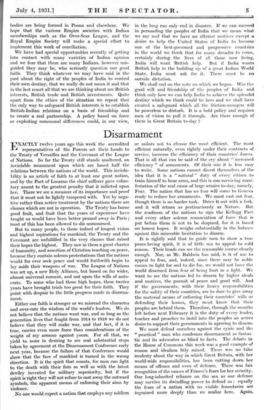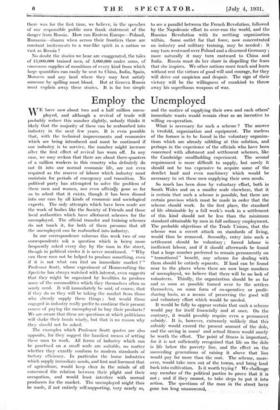Disarmament
FXACTLY twelve years ago this week the accredited representatives of the Powers set their hands to the Treaty of Versailles and the Covenant of the League of Nations. So far the Treaty still stands unaltered, an inviolable monument upon which are based half the relations between the nations of the world. This inviola- bility is an article of faith to at least one great nation, and by the Pact of Locarno the chief sufferer gave volun- tary assent to the greatest penalty that it infficted upon her. There we see a measure of its importance and proof that it must not be lightly tampered with. Yet by nega- tive rather than active treatment by the nations there are clauses which are not in operation. The Treaty has borne good fruit, and fruit that the years of experience have taught us would have been better pruned away in Paris ; most of this has been allowed to die unmoumed.
But to many people, to those indeed of longest vision and highest aspirations for mankind, the Treaty and the Covenant are unfulfilled in the very clauses that raised their hopes the highest. They saw in them a great charter of humanity, and assertion of Christian teaching on peace, because they contain solemn protestations that the nations wohld for ever seek peace and would forthwith begin to lay aside their weapons of war. The League of Nations was set up, a new Holy Alliance, but based on far wider, almost universal consent, and not upon the wills of auto- crats. To some who had those high hopes, these twelve years have brought trials too great for their faith. They point with despair to the little progress made in disarma- ment.
Either our faith is stronger or we misread the character and over-rate the wisdom of the world's leaders. We do not believe that the nations want war, and so long as the generation lives that fought from 1914 to 1918 we do not believe that they will make war, and that fact, if it is true, carries even more force than considerations of the weight of my armour against yours. For all that, we yield to none in desiring to see real substantial steps taken by agreement at the Disarmament Conference early next year, because the failure of that Conference would show that the face of mankind is turned in the wrong 'direction. It is the spirit that counts, for men can fight to the death with their fists as well as with the latest devilry invented for military superiority, but if the spirit is right they will not refuse to cast away the outward symbols, the apparent means of enforcing their aims by violence.
No one would expect a nation that employs any soldiers or sailors not to choose the most efficient. The most efficient naturally, even rightly under their contracts of service, increase the efficiency of their countries' forces. That is all that can be said of the cry about "increased efficiency" of armaments. Of their size it is less easy to write. Some nations cannot divest themselves of the idea that it is a " natural " duty of every citizen to train himself to bear arms, and this is one surviving mani- festation of the real cause of large armies to-day, namely, Fear. The nation that has no fear will come to Geneva ready to reduce her armaments. We must cast out fear, though there is no harder task. Drive it out with a fork, and it will return as pertinaciously as Nature. But the readiness of the nations to sign the Kellogg Pact and every other solemn renunciation of force that is put before them is not to be despised, for it is based on honest hopes. It weighs substantially in the balance against this miserable hesitation to disarm.
It is rightly said that to guide men to show a true peace-loving spirit, it is of little use to appeal to cold reason. Their heads can see the reasonable course clearly enough. Nor, as Mr. Baldwin has said, is it of use to appeal to fear, and, indeed, since there may be noble causes to fight for and to die for, we would not have the world disarmed from fear of being hurt in a fight. We want to see the nations led to disarm by higher ideals and motives, the pursuit of peace and good will. And if the governments, with their heavy responsibilities for the safety of their countries, are to dare to give away the material means of enforcing their countries' wills or defending their homes, they must know that their peoples are behind them. Therefore, through the months left before next February it is the duty of every leader, teacher and preacher to instil into the peoples an active desire to support their governments in agreeing to disarm.
We must defend ourselves against the cynic and the " practical " man who condemns disarmament as fantas- tic and its advocates as blind to facts. The debate in the House of Commons this week was a good example of reason and idealism fitly mixed. There was no false modesty about the way in which Great Britain, with her world-wide responsibilities, has been cutting down her means of offence and even of defence. There was fair recognition of the causes of France's fears for her security. Our long-inherited reliance on the sea as our defence may survive its dwindling power to defend us : equally the fears of a nation with no visible boundaries are ingrained more deeply than we realize here. Again, there was for the first time, we believe, in the speeches of our responsible public men frank statement of the danger from Russia. How can Eastern Europe—Poland, Rumania—disarm when across their frontiers there are constant incitements to a war-like spirit in a nation so vast as Russia ?
No doubt the stories we hear are exaggerated, the tales of 15,000,000 trained men, of 5,000,000 under arms, of enormous supplies of munitions of every kind from which large quantities can easily be sent to China, India, Spain, Morocco and any land where they may best satisfy someone by spilling most blood. But at Geneva Russia must explain away these stories. It is far too simple to see a parallel between the French Revolution, followed by the Napoleonic effort to over-run the world, and the Russian Revolution with its seething organization within. Some outlet for that force, now concentrated on industry and military training, may be needed : it may turn westward over Poland and a disarmed Germany ; more naturally it may turn eastward to China and India. Russia must do her share in dispelling the fears that she inspires. We other nations must teach and learn without rest the virtues of good will-and courage, for they will drive out suspicion and despair. The sign of their victory will be the willingness of mankind to throw away his superfluous weapons of war.











































 Previous page
Previous page